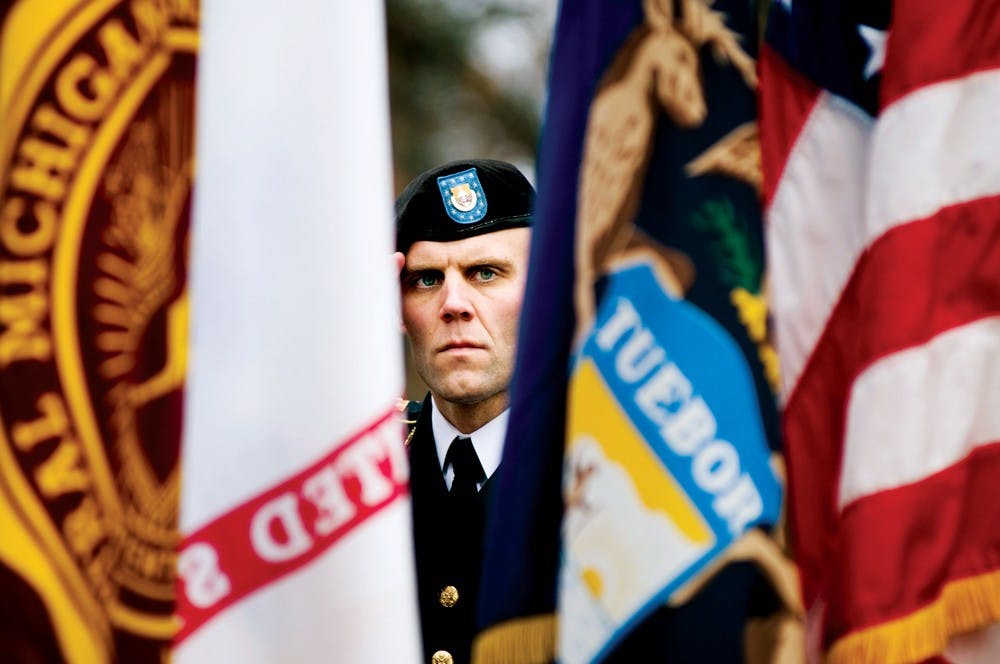Heroes day
Veterans Day, a time to remember, reflect and ask ourselves if we can do more

Veterans Day is a time to remember those who have fought for this country. Each year, we set aside time to honor the troops who have waged war in the pursuit of protecting our freedom and democracy. We're thankful that at Central Michigan University, that spirit is not lost. We're also proud of our student leaders, faculty members and administrators who help facilitate activities around campus on this day of remembrance.
These events celebrate the accomplishments and recognize the hardships faced by our troops. They vary from documentaries and panel discussions, to a traditional ceremony scheduled outside of Warriner Hall. Aside from educating our students about veterans issues and the problems they might face when they return home, the events also serve to highlight the university's on-campus resources, such as the Veterans Resource Center.
However, our outpouring of support hasn't always been as strong as it is now. Only now in our generation have these veterans been treated properly in the aftermath of isolation, violence and a constant fear for their lives while on the battlefield.
At times, it can be easy for us to dismiss the terrors of war and how our country treated these men and women in the past. We as civilians can have trouble relating to an event we weren't present for, but that doesn't mean it didn't happen and we shouldn't acknowledge it.
It also doesn't make the experience any less brutal.
The way we view our veterans has shifted greatly within the last 30 years. Our perception of our troops has waned from complete glorification of our troops after World War II and Korea from 1940-50, to vilification and disdain during the years following the Vietnam War not 10 years later.
Thankfully, our country has made a conscious effort to progress toward bettering the lives of veterans when they return home. The sentiment shared has improved tremendously. We have worked harder to accept them, to understand and empathize with their experiences and provide them with the mental health support they need.
Despite these advances, we shouldn't dismiss the opportunity to educate ourselves on what still needs to be done. We have to place ourselves in the combat boots of our veterans from 30 to 40 years ago, and not repeat the mistakes we made when they do come back.
After years of non-stop exposure to the ravages of war, these troops coped through drug abuse to forget the unwillingly imprinted scenes of war. To make it even worse, they weren't welcomed home as heroes, to treatment facilities or open arms willing to put them back on their feet.
It wasn't until the 1980s that post traumatic stress disorder was defined or identified as a distinct phenomenon. It took Congress a decade after the Vietnam War to mandate a comprehensive study of PTSD problems among veterans.
It has been 34 years since PTSD was taken seriously by the government, not long at all. These troops weren't cared for properly for years after their deployment.
Now, our government has worked tirelessly to address the effects of these disorders. PTSD is persistent; it has long-lasting symptoms that can occur for many years.
With this in mind, is simply holding a series of events on Veterans Day enough to make up for our mistakes 30 years ago?
We need to be doing more. There needs to be more research conducted on the treatment of PTSD. We need to not only remember our troops of today's war, but also those who weren't as lucky to have an understanding generation backing them up.
These troops from years past endured each day of unimaginable hell with only one hope, getting home to their loved ones in peace. Every day, their eyes capture images of death, poverty, warfare and acts of violence. They would fight for a chance to remember home, a safe haven where they were supported, not targeted.
PTSD is not a disorder to take lightly. Treatment is crucial to veterans who face the battlefield everyday at home. Taking a human away from the violence doesn't heal the years of overexposure to the immoral acts of killing and loss of innocence.
We thank CMU for its continued efforts, and we implore its students, and the community, to always ask if we can do more.



